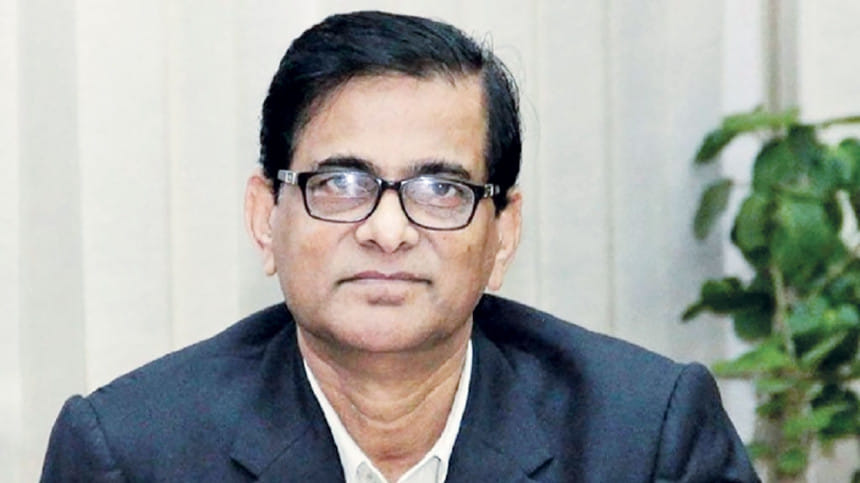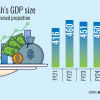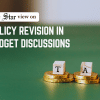FY 2022-23 budget to be cautiously larger

The government is preparing the budget in a cautious way, refraining from increasing expenditure by too much of an extent, keeping in mind the ongoing global economic crisis stemming from the pandemic and Russia-Ukraine war, State Minister for Planning Shamsul Alam said.
In the coming fiscal year, overall public spending is projected to be at 15.4 per cent of the gross domestic product (GDP), the lowest in seven years.
The state minister termed the ongoing economic crisis an international economic problem leading to recession. But the government is aware of this challenge, he said.
"We are aware of it and we will be making our budget facing the challenges…the combined effects of these two great debacles of our present time," Alam said in an interview with The Daily Star recently.
"We will prepare the next budget in a very cautious way, not increasing or expanding the budget expenditure too much, irrespective of what is written in the five-year plan. It will be lower than what is predicted in the 8th Five Year Plan," he said.
The 8th Five Year Plan was prepared assuming 2023 would be like any other normal year, he said.
The size of the draft budget for the next fiscal year of 2022-23 has been fixed at Tk 678,064 crore while the 8th Five Year Plan projected that the budget size of FY23 would be Tk 7.92 lakh crore.
The proposed size of the budget for FY23 is 12 per cent bigger than the original budget of the current FY22 at Tk 6,03,681 crore.
The size of the current year's budget is 17.5 per cent of the GDP while the size of the budget for the next fiscal year is projected to be 15.4 per cent of the GDP.
Regarding measures to be taken in the upcoming budget, he said the budget would not be very ambitious this time while the government was laying emphasis on the measures that would help face challenges pertaining to inflation right now.
The state minister said caution needs to prevail although the country's economy has been doing well even during the Covid-19 period compared to many other countries and it performed well in terms of macroeconomic management.
The rise of inflation did not originate in Bangladesh, by the increase in demand or by the increase in costs up until now, he opined.
The country has been hit by a rise in inflation due to price hikes in the global market as it needs to import many of the essential commodities, he said.
The government plans to take up large scale social safety net programmes amidst a rise in the number of people with no income or those who are financially insolvent, he said.
This time the budgetary allocation for social protection measures will be over 3 per cent of the GDP, said Alam.
The government will have special programmes for the creation of jobs in rural areas and is planning special funds for the creation of jobs for the poor, he said.
Existing social protection measures or activities like vulnerable group feeding (VGF) will continue, he said.
The government will take measures so that markets can function in a normal fashion and so that there is no disruption, he said.
The state minister informed that the number of government projects would be the lowest this year than any other time before.
"We will reprioritise projects," he said.
The government will lay emphasis on projects which will help enhance production capacity, particularly in agriculture, and create jobs, he said.
"And we will prioritise those projects that will help exports in terms of facilitating ports, transports," said the state minister, adding, "That will be the target."
And, projects which can be taken up later will be deferred by a couple of months or may be for one year, he said.
On the number of projects that could be deferred, the state minister refused to divulge any figure.
Asked whether the increase of foreign loans is a matter of concern in context to the debacle Sri Lanka was facing, the minister said the debt to GDP ratio was quite high in the neighbouring island country, above the danger level.
Mentioning that the country's foreign loans were still quite low, he said, "We are quite in the safe zone. We really don't understand why we are compared to Sri Lanka."
"Rather we helped Sri Lanka by providing $250 million as loan," he said.
Regarding the pressure on the country's foreign currency reserve, the state minister said the country would overcome this problem as exports were buoyant.
"And we will try to contain the import of luxury items and perhaps we will be imposing some tariffs on different commodities which we have our own capacity to produce," he said.
Mentioning that the country's current account deficit is less than one percent of the GDP now whereas 2.4 per cent is considered to be a threat, he said, "There too we are in the safe zone."


 For all latest news, follow The Daily Star's Google News channel.
For all latest news, follow The Daily Star's Google News channel. 








Comments